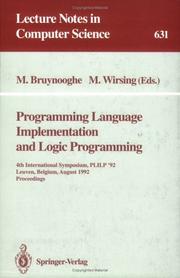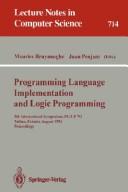| Listing 1 - 6 of 6 |
Sort by
|
Book
Year: 1979 Publisher: Leuven : Katholieke Universiteit Leuven (KUL),
Abstract | Keywords | Export | Availability | Bookmark
 Loading...
Loading...Choose an application
- Reference Manager
- EndNote
- RefWorks (Direct export to RefWorks)
Informatique - programmation --- Informatique - programmation

ISBN: 3540558446 0387558446 3540472975 Year: 1992 Volume: vol 631 Publisher: Berlin : Springer-Verlag,
Abstract | Keywords | Export | Availability | Bookmark
 Loading...
Loading...Choose an application
- Reference Manager
- EndNote
- RefWorks (Direct export to RefWorks)
This volume contains the papers accepted for presentation at the Fourth International Symposium on Programming Language Implementation and Logic Programming (PLILP '92) held in Leuven, Belgium, August 26-28, 1992. Theaim of the symposium was to explore new declarative concepts, methods and techniques relevant for implementation of all kinds of programming languages, whether algorithmic or declarative. The symposium gathered researchers from the fields of algorithmic programming languages as well as logic, functional, and object-oriented programming. The topics discussed in the volume include: - Declarative implementation techniques; - Implementation of declarative concepts and modules; - Compiler specification and construction; - Program transformation; - Programming environments for declarative languages; - Amalgamation of logic programming with algorithmic, functional, or object-oriented techniques; - Executable specification.
681.3*D31 --- 681.3*F33 --- 681.3*F41 --- 681.3*F42 --- 681.3*I23 --- Formal definitions and theory: semantics; syntax (Programming languages)--See also {681.3*D21}; {681.3*F31}; {681.3*F32}; {681.3*F42}; {681.3*F43} --- Studies of program constructs: control primitives; functional constructs; program and recursion schemes; type structure (Logics and meanings of programs)-- See also {681.3*D32}; {681.3*D33} --- Mathematical logic: computability theory; computational logic; lambda calculus; logic programming; mechanical theorem proving; model theory; proof theory;recursive function theory--See also {681.3*F11}; {681.3*I22}; {681.3*I23} --- Grammars and other rewriting systems: decision problems; grammar types; parallel rewriting systems; parsing; thue systems (Mathematical logic and formal languages)--See also {681.3*D31} --- Deduction and theorem proving: answer/reason extraction; reasoning; resolution; metatheory; mathematical induction; logic programming (Artificial intelligence) --- 681.3*I23 Deduction and theorem proving: answer/reason extraction; reasoning; resolution; metatheory; mathematical induction; logic programming (Artificial intelligence) --- 681.3*F42 Grammars and other rewriting systems: decision problems; grammar types; parallel rewriting systems; parsing; thue systems (Mathematical logic and formal languages)--See also {681.3*D31} --- 681.3*F41 Mathematical logic: computability theory; computational logic; lambda calculus; logic programming; mechanical theorem proving; model theory; proof theory;recursive function theory--See also {681.3*F11}; {681.3*I22}; {681.3*I23} --- 681.3*F33 Studies of program constructs: control primitives; functional constructs; program and recursion schemes; type structure (Logics and meanings of programs)-- See also {681.3*D32}; {681.3*D33} --- 681.3*D31 Formal definitions and theory: semantics; syntax (Programming languages)--See also {681.3*D21}; {681.3*F31}; {681.3*F32}; {681.3*F42}; {681.3*F43} --- Programming languages (Electronic computers) --- Congresses --- Logic programming --- Computer science. --- Information theory. --- Logic design. --- Artificial intelligence. --- Programming Techniques. --- Theory of Computation. --- Programming Languages, Compilers, Interpreters. --- Logics and Meanings of Programs. --- Mathematical Logic and Formal Languages. --- Artificial Intelligence. --- AI (Artificial intelligence) --- Artificial thinking --- Electronic brains --- Intellectronics --- Intelligence, Artificial --- Intelligent machines --- Machine intelligence --- Thinking, Artificial --- Bionics --- Cognitive science --- Digital computer simulation --- Electronic data processing --- Logic machines --- Machine theory --- Self-organizing systems --- Simulation methods --- Fifth generation computers --- Neural computers --- Design, Logic --- Design of logic systems --- Digital electronics --- Electronic circuit design --- Logic circuits --- Switching theory --- Communication theory --- Communication --- Cybernetics --- Informatics --- Science

ISBN: 0387571868 9780387571867 3540571868 9783540571865 Year: 1993 Publisher: Berlin : Springer-Verlag,
Abstract | Keywords | Export | Availability | Bookmark
 Loading...
Loading...Choose an application
- Reference Manager
- EndNote
- RefWorks (Direct export to RefWorks)
"This volume contains the proceedings of the Fifth International Symposium onProgramming Language Implementation and Logic Programming (PLILP '93), held in Tallinn, Estonia, in August 1993. The series of PLILP symposiums was established to promote contacts and information exchange among scientists who share common interests in declarative programming techniques, logic programming, and programming languages imnplementation. Researchers from the fields of algorithmic programming languages as well as logic, functional, object-oriented, and constraint programming constitute the audience of PLILP. The volume contains three invited talks and 24 selected contributed papers grouped intoparts on: integration of different paradigms, constraint programming, staticanalysis and abstract interpretation, grammars, narrowing, parallelism, and implementation techniques. The volume closes with six abstracts of systems demonstrations and posters."--PUBLISHER'S WEBSITE.
Programming languages (Electronic computers) --- Logic programming --- Conferences - Meetings --- Congresses
Book
Year: 2015 Publisher: Leuven KU Leuven.Faculteit ingenieurswetenschappen
Abstract | Keywords | Export | Availability | Bookmark
 Loading...
Loading...Choose an application
- Reference Manager
- EndNote
- RefWorks (Direct export to RefWorks)
Over the last decades, the amount of available data has grown rapidly. Data mining is the field studying how to discover interesting knowledge from data. When the data points are drawn identically and independently (i.i.d.), classical data mining techniques work well in practice. In particular, the employed statistical theories make sure that, if the sample size is large enough, then the mined knowledge is very likely to have a good generalization ability. However, the structure of available data becomes more and more complex, and the assumption that data points are drawn i.i.d. is violated. This usually makes the data less informative. We begin with defining support measures which gauge the frequency of a given pattern in a given dataset. For transactional datasets, one can simply count the occurrences of the pattern in the dataset. However, if the dataset is a large network, occurrences of a subgraph pattern may overlap, which makes the support measure definition less straightforward. For example, if we ignore overlaps and directly count the occurrences, we lose the important property of anti-monotonicity, which allows us to effectively prune in search spaces, An important class of anti-monotonic support measures relies on overlap graphs. Unfortunately, but all earlier overlap graph based support measures are expensive to compute. In this thesis, we introduce the concept of overlap hypergraphs, and propose an overlap hypergraph based support measure which is anti-monotonic and can be computed efficiently. In order to understand this support measure from a statistical point of view, we consider the problem of statistics on networked examples. We propose a model for representing networked examples as hyperedges in a hypergraph and reasonable assumptions to replace the classical i.i.d. assumption. Based on this model, we design an estimator on networked examples with the minimum variance and generalize Chernoff-Hoeffding inequalities to weighted networked examples. We can observe a close relationship between the effective sample size and the graph support measure we proposed. Our statistical concentration results can be used to adapt learning principles to learning from networked examples. We illustrate this by proving generalization error bounds for the empirical risk minimization principle.
Book
Year: 2016 Publisher: Leuven KU Leuven.Faculteit ingenieurswetenschappen
Abstract | Keywords | Export | Availability | Bookmark
 Loading...
Loading...Choose an application
- Reference Manager
- EndNote
- RefWorks (Direct export to RefWorks)
During the last decade or so, the amount of data that is generated and becomes publicly available is rapidly growing. This makes it impossible to extract useful information from this huge amount of data manually without using automatic tools and algorithms. Data mining has been defined as the process of automatic extraction of useful and previously unknown information from a large dataset using techniques from statistics, artificial intelligence and database management. Furthermore, in many applications, such as Bioinformatics, the world wide web, social and technological and communication networks, data are usually represented with graphs. This makes graph mining practically interesting, while also a challenging research area, due to high computational cost involved in processing graph data. In this dissertation, we investigate two key problems in graph mining: frequent pattern mining and betweenness centrality computation. Existing algorithms for finding frequent patterns from large single networks mainly use subgraph isomorphism. However, subgraph isomorphism is expensive to compute: deciding whether one graph is subgraph isomorphic to another graph is NP-complete in terms of the sizes of the graphs. Recently, a few algorithms have used subgraph homomorphism. However, they find very restricted classes of patterns such as trees. The main challenge with pattern mining under subgraph homomorphism is the pattern generation phase. In this work, we go beyond trees and propose an efficient algorithm for mining graph patterns from large networks under homomorphism. We introduce a new class of patterns, called rooted graphs, and present an algorithm for complete generation of rooted graphs. We also propose a new data structure for compact representation of all frequent patterns. By performing extensive experiments on several real-world and synthetic large networks, we show the empirical efficiency of our proposed algorithm, called HoPa. We then present an efficient algorithm for subtree homeomorphism with application to frequent pattern mining. We propose a compact data-structure, called occ, that can encode and represent several occurrences of a tree pattern and define efficient join operations on the occ data-structure, that help us to count occurrences of tree patterns according to occurrences of their proper subtrees. Based on the proposed subtree homeomorphism method, we develop an effective pattern mining algorithm, called TPMiner. We evaluate the efficiency of TPMiner on several real-world and synthetic datasets. Our extensive experiments confirm that TPMiner always outperforms well-known existing algorithms, and in several cases the improvement with respect to existing algorithms is significant. Finally, we propose a randomized algorithm for unbiased estimation of betweenness centrality. We discuss the conditions that a promising sampling technique should satisfy to minimize the approximation error. We then propose a sampling method that fits better with these conditions. By performing extensive experiments on synthetic and real-world networks, we compare our proposed method with existing algorithms and show that our method works with a better accuracy.
Book
Year: 1990 Publisher: Leuven: [éditeur inconnu],
Abstract | Keywords | Export | Availability | Bookmark
 Loading...
Loading...Choose an application
- Reference Manager
- EndNote
- RefWorks (Direct export to RefWorks)
| Listing 1 - 6 of 6 |
Sort by
|

 Search
Search Feedback
Feedback About UniCat
About UniCat  Help
Help News
News